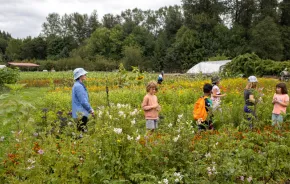There's a romantic notion about summertime that must be rooted in
decades past, or at least in old sit-coms. Where else but on the "The
Brady Bunch" would you find children roaming the neighborhoods
unsupervised, or bike riding solo to the park?
Yet, many parents wax nostalgic about their own childhoods, spent
gazing at cloud formations, enjoying that game of pick-up baseball or
simply swaying for hours on the homemade tire swing while channeling
Huckleberry Finn.
So much for wistful memories. The truth is, kids haven't been set loose
to meander through neighborhoods and playgrounds for quite some time.
Why not?
For starters, safety is an ever-present concern.
"The world has grown," says Christina Simonds, principal of Chestnut
Hill Academy in Bellevue. "Kids don't just hang out anymore. I know
what I worry about with my own kids -- that there are people out there
who may hurt them."
Then there's the double-career factor. These days, it's likely both
parents work and find it difficult -- " if not impossible" -- to be at
home throughout the summer months, says Margaret Fitzgerald, assistant
head and summer camp director of The Little School in Bellevue.
And let's not forget video syndrome. In the old days, bike rides and
fishing expeditions weren't competing with Xboxes and PlayStations.
Today, it's often an effort convincing youngsters to give up screen
time long enough to eat.
The result? Families rush to fill their children's summer days with
everything from tennis and soccer to math and science to dance and
drama.
Interestingly, the kids like all that scheduling, according to the
research organization Public Agenda. A 2004 study, "All Work and No
Play?" found that American young people believe organized activities
are important to them. The youngsters surveyed -- 85 percent of them --
feel kids who participate in teams or clubs are better off than those
with a lot of time to themselves.
Screen programs
But parents should look at programs thoughtfully. "Screen summer
opportunities with care," says Deborah Duitch of the Greater Seattle
YMCA. "Find something that fits your child. Some kids may want a
relaxed atmosphere; others need a lot of activity."
The Y's offerings include rock climbing, art, horseback riding, drama,
sports teams and swimming. The idea, Duitch explains, is to provide
kids with experiences that they won't have during the year.
Other Seattle-area programs are more education-oriented. Some
supplement school-year learning and offer subjects such as keyboarding,
science, math or foreign language. The key to enrolling in academic
programs is knowing when enough is enough: What looks like fun and
enrichment to some children might look like pressure and
power-programming to others. "If your child is stressing out, they are
being overscheduled," Simonds says.
Some parents, she notes, use camps and summer activities to give their
child a competitive leg up. "If you think a sports camp will help your
child be a star soccer player, ask yourself, is it your child who wants
to be the star or is it you?"
The best summer experiences are the ones that provide children with a
connection to their peers, Fitzgerald says. "During the school year,
they are with their friends ever day, building important relationships.
When summer comes, it suddenly ends," she notes. "Relationships mean
everything for young kids; it's important to keep up these contacts."
And don't underestimate the value of sheer enjoyment. "In today's
world, where children are often expected to adhere to strictly imposed
standards and goals, participating in summer activities that are
leisurely, fun and free from pressure will renew their spirits," she
says.
Or, as Simonds puts it: "If your children don't come home hot, sweaty
and dirty, they're not having a good time."
Linda Morgan writes frequently on education issues for ParentMap.
Summer program tips
Here are some ideas from Margaret Fitzgerald:
Preschool programs:
- Programs for 3- to 5-year-olds should be designed so children are in relatively small groups.
- Outdoor activities should be emphasized during the summer months.
- Outdoor
involvement should include opportunities for children to use their
large motor muscles while moving their bodies and learning to trust
their own physical abilities. - Preschool children benefit from day camp classes that are not limited to a pre-determined theme.
School-age programs:
- It's appropriate to allow children to choose a program with a specific focus.
-
School-age children benefit the most from being in small groups where
the adult/child ratio is not more than 10 or 15 children to one adult. - Children
also benefit from being involved in summer activities that allow them
to engage in important peer interaction without the stress of meeting
adult-imposed standards or goals.









